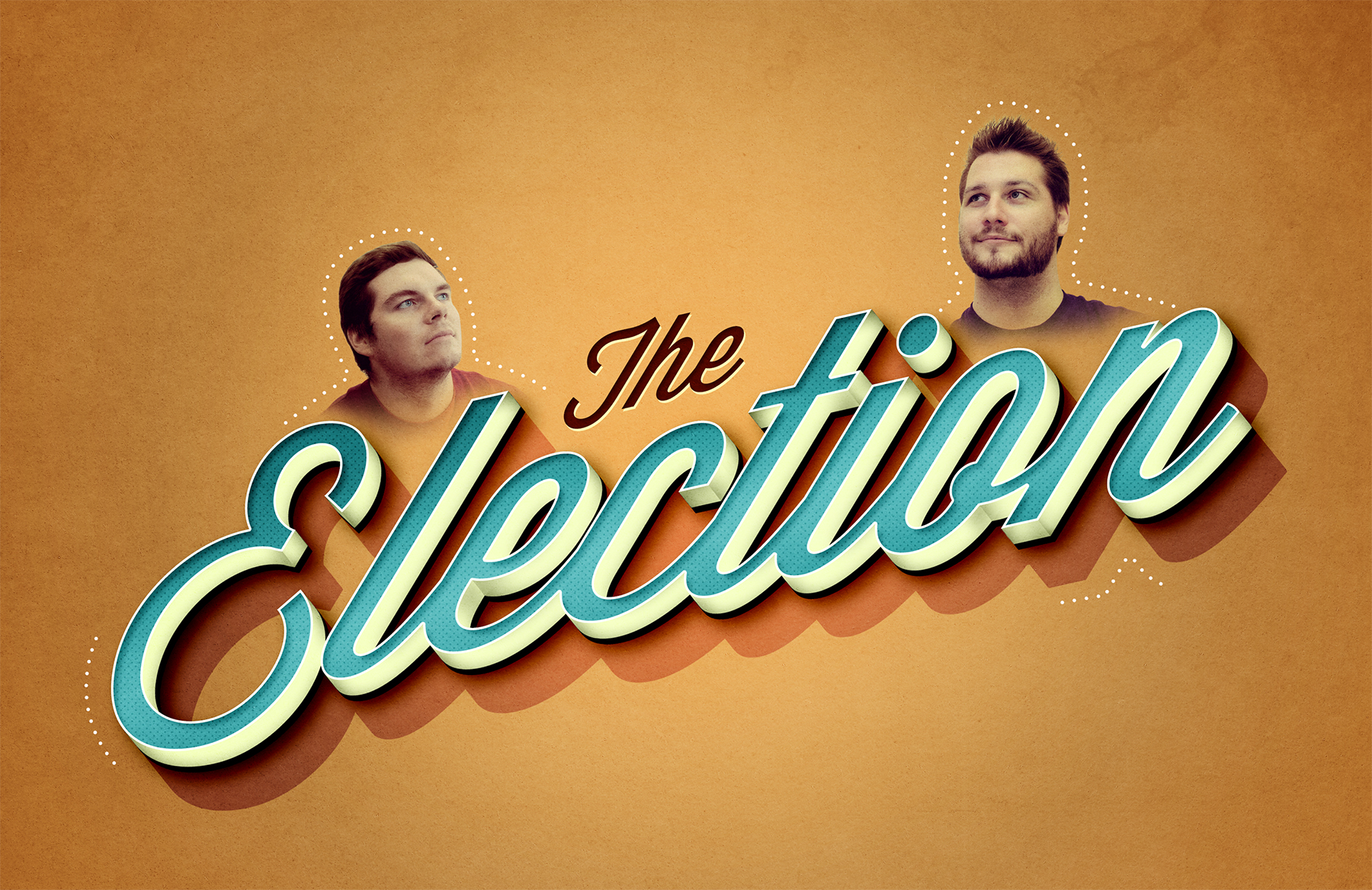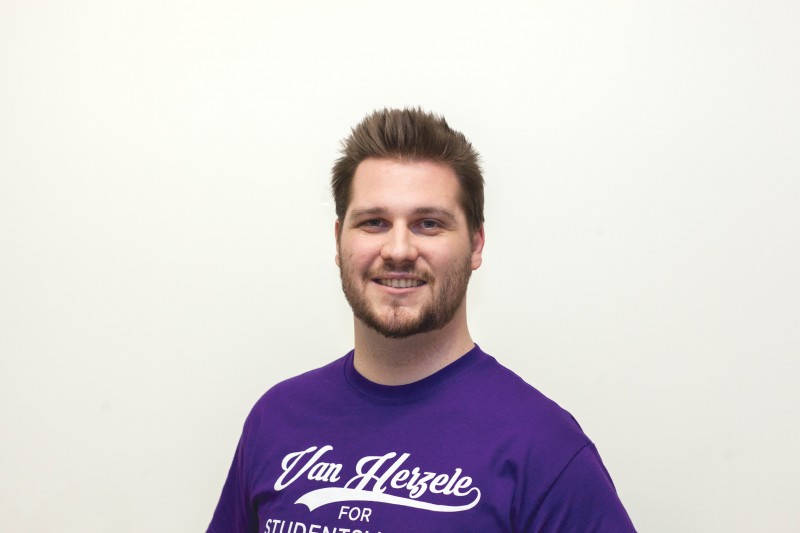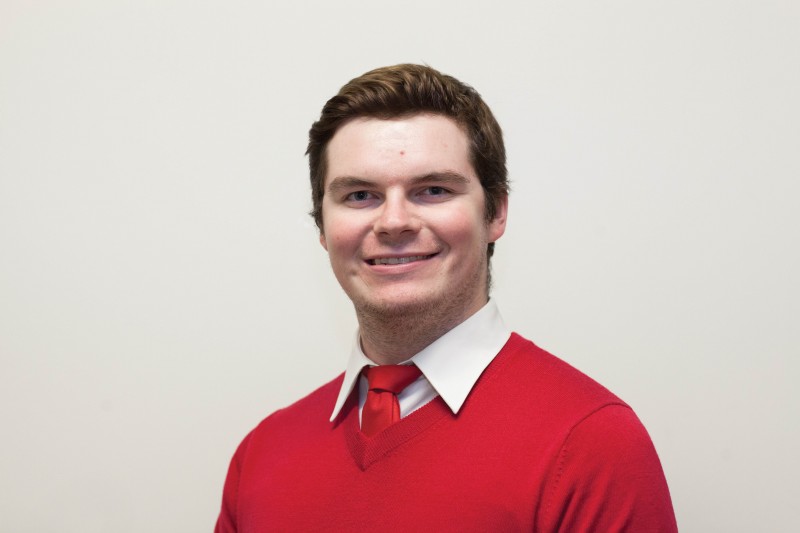Which candidate will answer the call?

Features Editor Bethany Bowles and Campus News Editor Kaitlyn Severin sat down with the Students’ Union presidential candidates to discuss their vision for the role

All interviews below are transcriptions with minimal stylistic changes made.
Tyler Murdock
How/when/why did you decide to run for Students’ Union president?
It’s kind of an interesting story. I had finished Orientation Week this year, I was kind of wrapping up all of my stuff in the office, I had a lot of lieu time built up so I was kind of doing a lot of work at home, relaxing, and in that point in time I was like, ‘okay this is a nice kind of cap in my Laurier career, I’m ready to graduate and head home.’ I had a couple of conversations, I’m going to say jokingly because they weren’t serious at the time but I was kind of joking about it in a sense of … you should consider running for president and I was like ‘oh that’s kind of funny, I don’t know, maybe.’ Then it was Orientation Week and at volunteer appreciation I had a couple of volunteers say to me kind of just, not even intentionally just tell me how good of a positive effect I had on them and how thankful they are that I was in that position, how they’re really sad that I’m leaving and I had so much more to offer, and that was the first time I was like, ‘maybe what people are telling me is real, maybe I do have a lot to offer to these students and I can still affect the student experience in a positive way.’ I kind of went home and thought about it for quite a bit and I mentioned to a couple of friends that I wanted to do this but I don’t know, it’s a lot to commit, it’s a lot. Like do I want to do all of this? I met with Olivia [Matthews] and I was like, I worked here all summer, I like your job but there’s a lot to it, I want to learn more about it and went from there and I had a lot of positive experiences along the way like, ‘I’m so happy you’re doing this, this is a great idea.’ So the more that I was [thinking] I don’t want to do it, the more I was like you should do it, and so that’s where it originally clicked. From there, people have been saying I still really want you to give a positive experience to others as you gave to me, so that’s where it all came from.
Why are you the best candidate for this job?
I would say I’m the best candidate for the job not only based on experience, having the past is definitely beneficial, but more so just my passion for helping students find what they love. That kind of directly kind of comes down to my passion for advocating on behalf of them. That’s a huge part of that role is advocating on behalf of what students want and the passion I have for helping students find the tools they need to succeed, is the tools that I can find through advocacy. I’ve done a lot of work on both campuses through both advocating on their behalf and working with students on both campuses, I think that’s really beneficial going into to this role. I think it comes down to my passion to increase or improve the student experience for them, my passion for wanting to see students succeed in one way or another and I think that’s something that I could really help with.
Can you critique one aspect of the current president’s performance?
Olivia has done a really, really good job when it comes to advocating on behalf of students in the big picture, so whether that be the transportation in Brantford or whether that be any of the big advocacy stuff that she’s done, but one thing that I want to really improve next year is enhancing the current committees and programs that we have within the Students’ Union that not having been done. I really want to focus on promoting what we have because there’s a lot of change to those this year and a lot of students are still kind of confused to those changes. I really want to improve on communicating what those do, what they offer, how they got on my platform about pairing up certain committees as a group like Residence Life or communicating certain university programs that could benefit students, so that’s my thing that I want to improve on or enhance next year.
If president, how are you going to advocate for students on the Brantford/Waterloo campus?
If president, advocating for Brantford students first thing, I guess, would be kind of ensuring that I could completely understand what’s going on over there. I think I have an understanding of the experience from working over there. One thing I want to get across is I am from Waterloo, but it’s a multi-campus candidate position and I have worked over there a lot even though I’m from this campus, vice versa for Tyler, that’s really what I want to get across. I kind of want to go over there and ensure that I understand what’s going on over there, whether that be through surveys or just walking around with students. One thing I’ve done when I was there [on January 20] was kind of chatting with them because I have a lot on my platform about Brantford ideas and just chatting with them to make them understand where I’m coming from. That is something that is going through their heads at the same, so I guess it would just be about student data and making sure that their thoughts are on the same page as mine because a lot of the stuff I have came from Brantford students that were on my team and I met with them over there and I want to make sure that I’m understanding fully the situation to be able to advocate on their behalf, I guess.
You mentioned in your platform that the Students’ Union has provided you with the tools you need to succeed and as president you hope to make these tools easier for students to access. What are these tools and how will you make them accessible to students?
The tools I’m kind of referring to is the stuff that I’ve been fortunate to tap into. There’s a lot of mentorship-type programs that aren’t necessarily there on purpose but there’s just stuff to look through getting involved in different things. Even through being involved in Orientation Week, I had upper-year students in my program help me when I was in second or third year. They kind of gave me advice on what classes to take or that kind of stuff. The simpler tools I want to [use, but] also kind of the bigger scale tools. There’s a lot of tools you could use to succeed through hiring recruitment, that idea of how to actually apply to jobs and that kind of stuff, whether that be through the tools just on campus safety, like Foot Patrol or Emergency Response Team, making those easier to access for students and know they can use that program when they’re not feeling safe. There’s a lot of tools within Peer Connect about the resources on campus and who to talk to or maybe you’ve suffered mental illness. I want students to understand those tools are available, but as a whole, the Students’ Union has provided me a lot of tools through being involved with it. I learned a lot with myself getting involved in it [and] I want students to understand that’s something that’s available here, too. It’s not just about committing to a committee; you learn a lot of real life skills whether it’s direct or indirect, you learned a lot about yourself and what to do in situations and those are the kind of tools I want students to understand are available, and also comes out of campus clubs. There are a lot of clubs out there you can get involved in that’ll teach you a lot about yourself and all those tools also. I want them to know they’re directly there for you to use and that’s something a lot of students, like I said before when I came to university, I came from a really small farm town, so students that come to Laurier or any university from my area don’t necessarily come with the most drive to get involved because that’s just not the way the life is up there. In that sense, I want students to understand … those students who come from any area come here and even come from the city, that idea that like I don’t know what I want to get involved in and I want them to understand that drive and just put yourself out. There’s a whole lot you can learn outside the classroom; there’s a lot of experience outside the classroom that can teach you also.

Tyler Van Herzele
How/when/why did you decide to run for Students’ Union president?
Yes, that’s a big question. It’s been on the back of my mind probably since third year. I joined a presidential team then, and I was on one last year, as well. So, I find it very interesting to be around elections. I decided officially at the end of last year, during winter term. I sat down with one of my good friends, Nicole Dilliot, and we just caught up, it had been some time. We talked about elections, she wanted to be on a team. It was right then and there that I made up my final decision. That was after two and a half weeks of struggling between what I wanted to do, but my heart’s set on it now. That’s for sure.
Why are you the best candidate for this job?
Why am I the best candidate? Wow. Well, I know my passion is true. I know my goal to really enhance the student experience runs through every inch of my body. It’s something I really want to accomplish. As for me, personally, through my experiences, I have really been around the university, outside of the Students’ Union, as well. I understand the organization that way through the volunteerism and being a member of the staff teams in the past. But, it’s my experience outside of the Students’ Union that has really opened my scope to understanding what student life means outside of volunteerism with the Students’ Union, so I feel like that makes me a great candidate. I can connect with those students who might not be volunteers. I really do want to bring to the fold that everyone is a member of the Students’ Union; those services are available to everybody.
Can you critique one aspect of the current president’s performance?
Critique one aspect of Olivia’s performance? She is a go-getter and she never stops going. I think that she has put her entire body and soul into this job and I think that could be weighing on her quite a bit. I think she’s done an incredible job on paper and in person, as well, but I think that she needs to take some time for herself, especially in the upcoming months. I know transition will be tough, but I think she’s done a phenomenal job. As for her performance, I don’t know if I could critique much about it. She’s a lot of what I look to and look to become, hopefully, if elected.
If president, how are you going to advocate for students on the Brantford/Waterloo campus?
Advocating for all Laurier students is something I’ve really put my focus towards. When you want to look at the volunteer side of my, if you want to call it, portfolio or experiences, it’s been very Brantford-centric because I’ve been on that campus more. I’ve spent the past four years being on and off of the Waterloo campus, as well and like I mentioned, last year I was volunteering with the multi-campus training committee. So I really got a chance to see the student experience on both campuses in some light. As for making sure that they are being represented, it’s my goal to make sure that all students are being represented and heard. I feel that there might be a stigma around the Students’ Union and I don’t know if that’s necessarily what we want to have as a Students’ Union, so hearing students, making those personal connections, listening and then acting on what the student voice is saying is the job of the Students’ Union president and I want to make sure I embody that for all students, regardless of program or campus. I’m not a music student, I’m not a journalism student, I’m not a business student, but I am a Laurier student. So I absolutely understand what it means to be a Golden Hawk.
In your platform, you discuss the importance of breaking stigmas surrounding mental illness. Why is this important to you and how will you do this if elected?
The mental health pillar is probably the one that’s closest to my heart. I’ve had personal interactions with mental health and mental illness. On an individual level, I struggled for a year with depression. Getting over that was much to do with the services that we have at Laurier. I want students to really understand that those services are there for you. I want students to be comfortable with the stigma. I want them to understand that talking about mental illness is not something that you aren’t supposed to do. You’re supposed to be comfortable in that and ensure that these partnerships with the Students’ Union and the Wellness Centre and the Diversity and Equity Office are strong. We can really get that word out there for all Laurier students. Mental illness affects everybody, regardless if it’s you personally or a friend. I’m in Residence Life as a don this year, and I can see it. I see stress turn into anxiety, or depression or something more. So, it’s definitely important to touch upon that.



